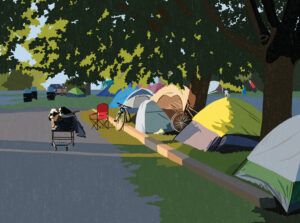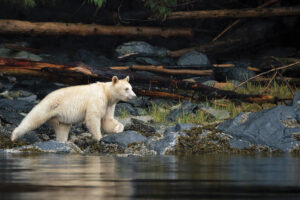
People & Culture
Kahkiihtwaam ee-pee-kiiweehtataahk: Bringing it back home again
The story of how a critically endangered Indigenous language can be saved
- 6310 words
- 26 minutes
People & Culture

Filsan Abdiaman is a Kenyan-Somali-Canadian Muslim woman who is an ultra runner, a personal trainer and a running coach. She is the founder of Project Love Run (PLR), a running collective for self-identifying women. It offers a safe space for women to come together, share stories, run and brunch. “The takeaway message that we leave with women is that you are loved and that you are worthy,” says Abdiaman.
We spoke with Filsan about running, mental health and creating community.
On how she started running
I didn’t really start running until I was 25. When I moved to Canada, I was 18, so it took me a couple of years to find my way to running. One of the main reasons I started was to help with my fitness. I was working with a trainer who suggested it as a form of cardio.
But I was also using it as a tool to run away from a lot of internal turmoil I was experiencing. I was going through depression. I’d had my first anxiety attack not long before I started — brought on by a breakup — and I didn’t have the coping tools to manage what was going on inside. I then went back to Kenya after being away for eight years (which was more running away). When I returned a couple of months later, I signed up for my first 5K race. I did a lot of soul searching too. I realised I didn’t enjoy what I’d been doing for my career so much as this: the running and the fitness. I decided to pursue a personal training certification. I was filled with so much joy from setting myself a goal and accomplishing it that I was motivated to do more races.
I started working as a personal trainer and the very next year I did a half marathon. Year after that, a full marathon. All the while I never sought therapy or professional help to help me deal with my anxiety attacks and depression. I think I buried that very deep and this was a result of my cultural upbringing.
On how she tackled her anxiety and depression and how that shifted
When I went back to Kenya after being gone for eight years, I was thinking, “I’m going to leave Canada, and I’ll feel a lot better.” That didn’t happen. When I was in Kenya, I remember still struggling with anxiety attacks. I remember trying to talk to my parents, but they didn’t make it easier. They were very dismissive, which made me feel embarrassed. I then didn’t want to talk about it, with my parents or anyone else. I did tell my sister and she’s the one who pushed me to go see a therapist.
When I came back to Canada, I was referred to a therapist, but it felt like he didn’t take it seriously. Following that conversation with my parents, I felt like I was shut down again and I never went back. There was a lot of shame surrounding what I was going through and that led to me pushing it away and living in denial. I just lowered my head and told myself it wasn’t happening to me. I convinced myself that I’d find another way to deal with it. The running was what I used.
At this time, my running was mainly focused on performance and speed. I’d set myself difficult goals and push myself to achieve them. I was obsessed with working out, pushing myself to reach this body ideal. So I worked really hard to get there — and when I did, I still was not happy. I thought I would find happiness after pushing myself. But that wasn’t the reality.

With all this training and excursion, I lost my period when I started running marathons. For me it was part of the process, so I didn’t seek help medically for it. I was also training really hard, and I wasn’t eating enough, so I started to binge eat. Then I’d get scared that I was going to put on weight, so I’d force myself to purge. It happened one time and I promised myself it wasn’t going to happen again. I didn’t seek out any help and months passed, then something else triggered the same pattern. This time I had no control, then it became this habit. I would binge and I would purge. I would binge and I would purge. My disordered eating became an eating disorder.
I struggled with bulimia when I turned 30 and moved to Vancouver. Being alone in a new city, it felt like that’s the only thing I had going for me. By then, I knew I needed help because it was affecting my training and I wanted to do more racing, so I found a therapist who I really connected with. I had regular sessions with her. She encouraged my journaling to be more self-focused, so I started writing love notes to myself. I set a goal to myself to write 100 love notes and run 100km — and I did. I noticed my mentality switch as to why I was running. It was now to find new ways of loving myself. I started to transform my relationship with running, to be kinder to myself, and to be gentler with my body. It really helped me recover from the eating disorder — and heal. I found a way to bring everything I learned to the community for Project Love Run, and even open up to my parents.
On why she started Project Love Run
I started Project Love Run in 2016 in Toronto. In hindsight, I see that I was searching for help and I wanted to create a space where I could be myself and show myself as Filsan, the woman who is struggling with an eating disorder. To be able to have these difficult conversations on subjects we don’t really talk about. Because that’s what I wanted to do, to tell someone my story. I eventually did share my story with the women of PLR and there were so many who could relate to what I had expressed. That motivated me to want to speak more about what I was going through. What I was finding challenging inside. And as the months went by, I began to put the mission and goals for PLR into place based on what I had experienced.
On what she learnt from her experiences
Having gone through all of that, I discovered that there is no shame in having depression, anxiety or an eating disorder. It’s part of being human: we’re imperfect, even if society makes you feel like there is a perfection you can attain. I learned that it’s your imperfections and your flaws that are your beauty; they are your signature in this world. And for me, my struggles made me stronger. They made me more confident. They helped me create this beautiful space and the PLR community.
On why sharing her experiences as a black woman is important
My identity really complicated my ability to express myself, because you don’t see a lot of black folks sharing about their struggles with anxiety and depression. For example, as a black runner, in the early stages of my binge eating I was looking up eating disorders. I wanted to understand what was happening with me and what I was going through. Everything that I found online was showing white, thin women in their early adult years struggling with an eating disorder. And when I looked up runners and athletes, same thing. I didn’t see any black women and I didn’t fit the profile that was being presented to me, so I didn’t believe that that was my problem. It led to my denial. It really complicated my ability to express myself and to find the help that I needed. That is why it took time for me to seek therapy.
I remind myself often on why representation is important, and it motivates me to keep talking openly about depression and my eating disorder, because I know someone else out there will come across, listen and connect to it. It can inspire them to seek the help that they need, to build the tools to recover and hopefully heal.

On the importance of nature
When I moved to Vancouver, it was to be closer to nature, and a lot of the trail races that I wanted to do were out west. That proximity to nature puts things in perspective in no other way. The runs that I was doing before were mainly urban road racing where the emphasis is on speed and performance. Out here the focus is richer: it’s the trails that you run, the mountains in the background, the trees that surround you. So that natural, beautiful backdrop allowed me to reflect a lot more and heightened my self awareness.
I feel deeply connected with myself and the surrounding nature. And doing trail races is always a mix of running and hiking. It’s a mixture of physical and mental strength. That’s why I picked it, and also ultra running. In ultra running there is so much “disappointment” because you rarely finish. I don’t finish a lot of ultra races, yet I still do them because it is in those gruelling races where I feel I grow the most. I have the most beautiful conversations with my body — I tune into every tiny ache or pain I experience along the way, and it makes me feel like I go into those races one way and I come out a different person.
On hopes for the future
I see an opportunity for putting programs out there that help women, not only to run, but to learn to love their bodies through that. My goal is to expand PLR further here in Canada. The dream, however, is for it to exist in a city like Nairobi where I know women like me will truly benefit from the mission of PLR because I think that is integral to the future of wellness. It’s something that is very sustainable.
Are you passionate about Canadian geography?
You can support Canadian Geographic in 3 ways:

People & Culture
The story of how a critically endangered Indigenous language can be saved

People & Culture
For unhoused residents and those who help them, the pandemic was another wave in a rising tide of challenges

Places
In Banff National Park, Alberta, as in protected areas across the country, managers find it difficult to balance the desire of people to experience wilderness with an imperative to conserve it

Wildlife
How ‘maas ol, the spirit bear, connects us to the last glacial maximum of the Pacific Northwest